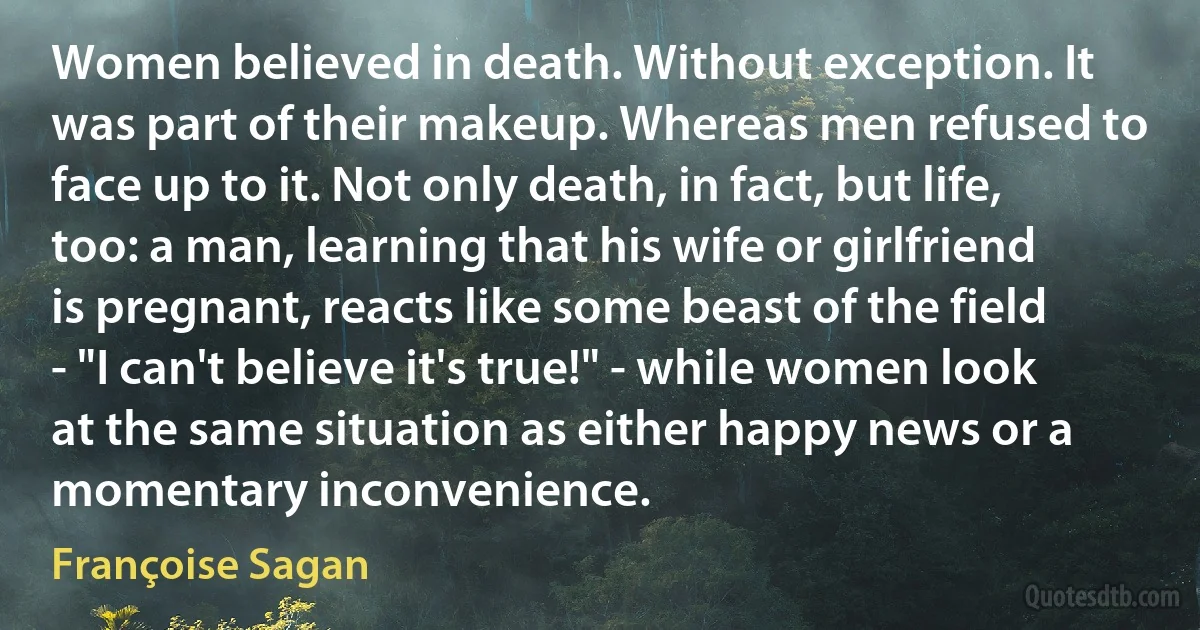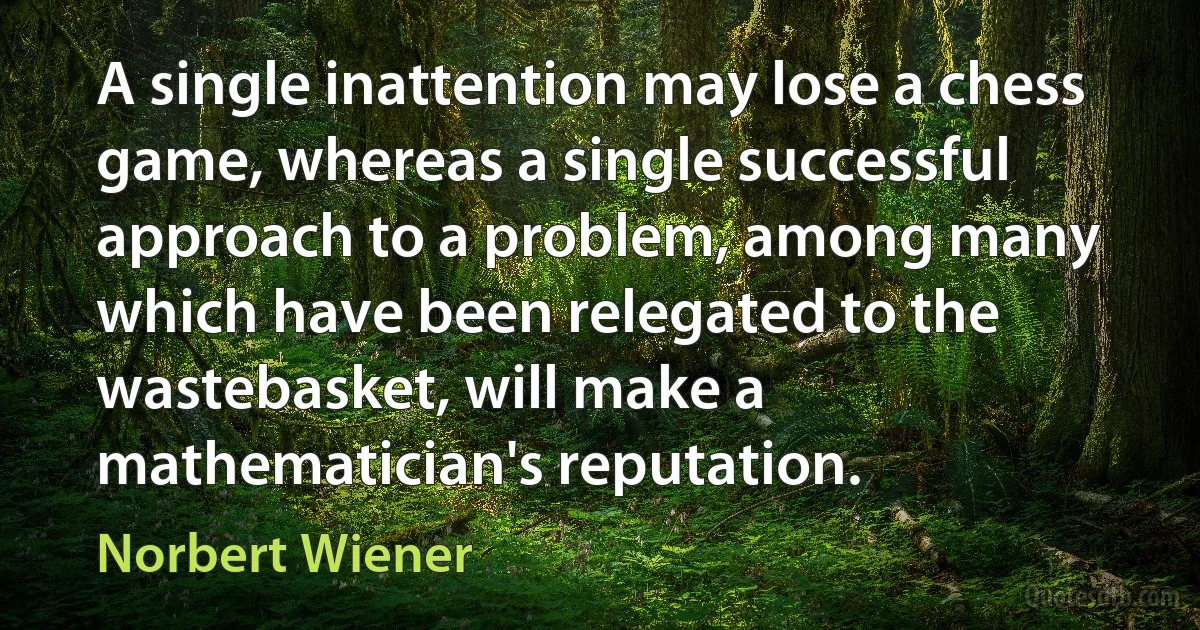Whereas Quotes - page 9
Anyone who compares the bibliography with the reprinted papers will notice that mathematics and physics have not been given equal treatment. There is a strong bias in favor of mathematics. The bias arises from the fact that mathematical papers, provided that are correct and not trivial, have permanent value, whereas most papers in physics journals are ephemeral. For this reason, it is customary to publish complete collected works of mathematicians but only selected works of physicists.

Freeman Dyson
What particularly attracted me [in his painting 'Still-life with Musical instruments', 1908 – 1909].... was the materialization of this new space that I felt to be in the offing. So I began to concentrate on still-life's, because in the still-life you have a tactile, I might almost say a manual space... This answered to the hankering I have always had to touch things and not merely see them. It was this space that particularly attracted me, for this was the first concern of Cubism, the investigation of space.... In tactile space you measure the distance separating you from the object, whereas in visual space you measure the distance separating things from each other. This is what led me, long ago, from landscape to still-life.

Georges Braque
Blue has no dimensions, it is beyond dimensions, whereas the other colours are not. They are pre-psychological expanses, red, for example, presupposing a site radiating heat... All colours arouse specific associative ideas, psychologically material or tangible, while blue suggests at most the sea and sky, and they, after all, are in actual, visible nature what is most abstract.

Yves Klein
And he waves the pages of the papers, black and white the way space was when the galaxies were being formed, and crammed-as space was then-with isolated corpuscles, surrounded by emptiness, containing no destination or meaning. And I think how beautiful it was then, through that void, to draw lines and parabolas, pick out the precise point, the intersection between space and time where the event would spring forth, undeniable in the prominence of its glow; whereas now events come flowing down without interruption, like cement being poured, one column next to the other, one within the other, separated by black and incongruous headlines....

Italo Calvino
When I was born 20.6. [18]87, I was influenced by Picasso to cry. When I could walk and speak I still stood under Picasso's influence and said to my mother: 'Tom' or 'Happening', meaning the entrances of the canal under the street. My lyrical time was when I lived in the Violet Street. I never saw a violet. That was my influence by Matisse because when he painted rose I did not paint violet. As a boy of ten I stood under Mondrian's influence and built little houses with little bricks. Afterwards I stood under the influence of the Surrealists... I never stood under the influence of Dadaism because whereas the Dadaist created Spiegel-dadaismus (Mirror-Dada) on the Zurich Lake, I created MERZ on the Leine-river, under the influence of Rembrandt. Time went on, and when Hans Arp made concrete Art, I stayed Abstract. Now I do concrete Art, and Marcel Duchamp went over to the Surrealists.... and at all I have much fun about Art.

Kurt Schwitters
I am a Communist because I am convinced that the reason we have been forcefully compelled to eke out an existence at the very lowest level of American society has to do with the nature of capitalism. If we are going to rise out of our oppression, our poverty, if we are going to cease being the targets of the racist-minded mentality of racist policemen, we will have to destroy the American capitalist system. We will have to obliterate a system in which a few wealthy capitalists are guaranteed the privilege of becoming richer and richer, whereas the people who are forced to work for the rich, and especially Black people, never take any significant step forward.

Angela Davis
Mr. Gibbon has much to learn concerning the gospel before he can be properly qualified to write against it. Hitherto he seems to have been acquainted with nothing but the corrupt establishments of what is very improperly called Christianity; whereas it is incumbent upon him to read and study the New Testament for himself. There he will find nothing like Platonism, but doctrines in every respect the reverse of that system of philosophy, which weak and undistinguishing christians afterwards incorporated with it.
Had Mr. Gibbon lived in France, Spain, or Italy, he might with the same reason have ranked the doctrine of transubstantiation, and the worship of saints and angels among the essentials of Christianity, as the doctrines of the trinity and of the atonement.

Joseph Priestley
Research into motion was not to the liking (or perhaps not within the scope) of the ancients, so that we may consider it as a completely new science. How could the ancients have discovered the laws of moiton, given that some philosophers reduced all their speculations about motion to sophistic disputes, whereas others denied that motion existed at all?

Pierre Louis Maupertuis
The media insist that crime is the major concern of the American public today. In this connection they generally push the point that a disarmed society would be a crime-free society. They will not accept the truth that if you take all the guns off the street you still will have a crime problem, whereas if you take the criminals off the street you cannot have a gun problem.

Jeff Cooper
I discovered soon that teaching has the handicap of retrospection. And that I don't believe in. So I started [at the w:Bauhaus in Dessau] instead a method of handling material with the material itself. So that was my main change. Whereas Itten before [Itten left the Bauhaus in 1923 and Albers followed him as art-teacher] had only spoken about the appearance, 'matiere' - (the French word) and I said I would turn from 'matiere' - the outside - to the inside, to the capacity of the material, before the appearance. And that changed the attitude basically I think.

Josef Albers
Euclidean geometry can be easily visualized; this is the argument adduced for the unique position of Euclidean geometry in mathematics. It has been argued that mathematics is not only a science of implications but that it has to establish preference for one particular axiomatic system. Whereas physics bases this choice on observation and experimentation, i.e., on applicability to reality, mathematics bases it on visualization, the analogue to perception in a theoretical science. Accordingly, mathematicians may work with the non-Euclidean geometries, but in contrast to Euclidean geometry, which is said to be "intuitively understood," these systems consist of nothing but "logical relations" or "artificial manifolds". They belong to the field of analytic geometry, the study of manifolds and equations between variables, but not to geometry in the real sense which has a visual significance.

Hans Reichenbach
When, therefore, as will be clear to those who read, the passage as a connected whole is literally impossible, whereas the outstanding part of it is not impossible but even true, the reader must endeavor to grasp the entire meaning, connecting by an intellectual process the account of what is literally impossible with the parts that are not impossible but historically true, these being interpreted allegorically in common with the part which, so far as the letter goes, did not happen at all. For our contention with regard to the whole of divine scripture is that it all has a spiritual meaning, but not all a bodily meaning; for the bodily meaning is often proved to be an impossibility.

Origen
Primarily, which is very notable and curious, I observe that men of business rarely know the meaning of the word 'rich'. At least, if they know, they do not in their reasoning allow for the fact, that it is a relative word, implying its opposite 'poor' as positively as the word 'north' implies its opposite 'south'. Men nearly always speak and write as if riches were absolute, and it were possible, by following certain scientific precepts, for everybody to be rich. Whereas riches are a power like that electricity, acting only through inequalities or negations of itself. The force of the guinea you have in your pockets depends wholly on the default of a guinea in your neighbour's pocket. If he did not want it, it would be of no use to you; the degree of power it possesses depends accurately upon the need or desire he has for it,- and the art of making yourself rich, in the ordinary mercantile economist's sense, is therefore equally and necessarily the art of keeping your neighbour poor.

John Ruskin
Passion is something which very few of us have really felt. What we may have felt is enthusiasm, which is being caught up in an emotional state over something. Our passion is for something: for music, for painting, for literature, for a country, for a woman or a man; it is always the effect of a cause. When you fall in love with someone, you are in a great state of emotion, which is the effect of that particular cause; and what I am talking about is passion without a cause. It is to be passionate about everything, not just about something, whereas most of us are passionate about a particular person or thing. I think one must see this distinction very clearly. In the state of passion without a cause, there is intensity free of all attachment; but when passion has a cause, there is attachment, and attachment is the beginning of sorrow.

Jiddu Krishnamurti
They say, 'you mean it's just sounds?' thinking that for something to just be a sound is to be useless, whereas I love sounds just as they are, and I have no need for them to be anything more than what they are. I don't want them to be psychological. I don't want a sound to pretend that it's a bucket or that it's president or that it's in love with another sound. I just want it to be a sound.

John Cage



